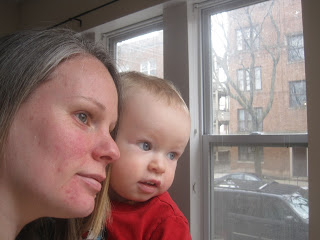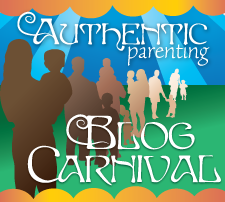 I have gotten a tremendous amount of positive feedback regarding my post from several months back, The Secret of Losing My Shit. I keep recirculating it, but I recently thought to myself, “Why? I have lost my shit like 5,453 times since then so why not just keep talking about this topic?” I consider myself a gentle parent, but that doesn’t mean I am always perfect and always gentle. It means that gentle parenting is my ideal and it is what I strive for. There is not a single person out there who has reached perfection at anything they do. Even professional baseball players who make flawless plays most of the time strike out sometimes. [Read more…]
I have gotten a tremendous amount of positive feedback regarding my post from several months back, The Secret of Losing My Shit. I keep recirculating it, but I recently thought to myself, “Why? I have lost my shit like 5,453 times since then so why not just keep talking about this topic?” I consider myself a gentle parent, but that doesn’t mean I am always perfect and always gentle. It means that gentle parenting is my ideal and it is what I strive for. There is not a single person out there who has reached perfection at anything they do. Even professional baseball players who make flawless plays most of the time strike out sometimes. [Read more…]
Gentle Parenting as a Road Rather Than a Destination
Hair He Comes!!
I just wanted to dry my hair. I bent over to shake it out and Jack found a favorite toy. He ran through it over and over. I got so annoyed. But his laughter penetrated my frustrated. I started to laugh. I allowed myself to just go with the flow and let him play. I always have my hair in a pony tail, his Dad has short hair and he has barely any hair. He needed to learn about hair!
A Day of Play at Target
Here Are a Few of Our Favorite Things
Choosing Our Words: Everyday Honesty With Children
By Guest Blogger Alice Romolo
Welcome to the February 2013 Authentic Parenting Blog Carnival: Honesty
This post was written for inclusion in the monthly Authentic Parenting Blog Carnival hosted by Authentic Parenting and Living Peacefully with Children. This month our participants have written about authenticity through honesty. We hope you enjoy this month’s posts and consider joining us next month when we share about Self-Expression and Conformity.
***
My children are not even three years old, yet they have been lied to many times by the adults they know. The lying is not a deliberate manipulation; I believe it is simply about adult convenience more than anything else. The people perpetrating these everyday lies do not believe they are doing wrong, rather they are thoughtlessly perpetuating the general lack of respect for children that is the norm in our society. At its most basic, we can say that people lie to children because they can; because it is easier to say, “There are no more cookies,” then it is to say, “I do not want you to have any more.” Before a certain age, that child has no way of seeing for themselves whether or not it is true.
A favorite phrase, among certain adults I know, almost always starts with “You don’t want…” as in, “You don’t want to touch that,” or “You don’t want to do that.” It makes me crazy to hear this said to my children or anyone else. Clearly, they do “want…” Clearly, you are telling them what YOU don’t want, so why not be honest? You cannot imagine the added level of cooperation you will get with this simple change. And if you add to that a reason, in line with their development and ability to understand, then all the better. This benefits your child in two ways; first it forces you to be more considerate and reasonable, if you need to come up with something better than, “because I said so,” and secondly, your child is learning real reasons for why things are a certain way, rather than learning to follow arbitrary, meaningless rules without question. If you want your children to one day be adults who question things when something doesn’t seem right rather than follow along with the crowd, then it is vital that you allow them to question you now.
Another common and equally untruthful phrase used against children is, “You’re ok,” when the child clearly isn’t. Do you really think that telling them that they don’t really feel the way they do is effective? What is the goal, exactly? Again, looking at this with a longterm perspective vs. short term convenience, it makes very little sense to convince an impressionable child to ignore their internal feelings and listen to someone else. Even if that someone else is you–because it won’t always be you; eventually it will be their friends or someone else. This tactic is very effective in producing a child who, after continually being forced to choose between trusting himself or the very influential, all-powerful people he looks up to, trusts neither.
Lying to children insults their intelligence, robs them of their autonomy, and takes advantage of their size and abilities. It erodes their sense of trust in you and people in general. Children do not understand the difference between the lies you feel are trivial and the really important ones that they may eventually tell you.
As children, we are programmed to lie to protect ourselves from shame and punishments. When lies regularly become safer than the truth, this does not magically end when we reach adulthood. I have found from experience that this insidious “Lying to protect oneself,” continues to cause problems throughout life, especially with partners and other close relationships. My husband, for example, is eternally unable to admit he is wrong, when I first try to tell him something. At least not without an argument lasting anywhere from five minutes to an hour or more. This has been especially true since embarking on my radical, full term breastfeeding, respectful parenting, and soon-to-be unschooling journey into motherhood. To say this has challenged everything he has ever known would be an understatement. It has challenged me as well, but this was a challenge I chose; he has been dragged, at times kicking and screaming, along for the ride. As a result, there have been many arguments–big ones.Things are improving though; partly through my increasing ability to communicate more effectively, thus making him see reason sooner (because I AM always right, after all) and the fact that I have been making a concerted effort to ensure he feels safe to put his ego aside and really listen. It wasn’t always like this, mostly due to my own significant issues with trust, and unconsciously held beliefs that being right at any cost is more important than peace and happiness. Because to be wrong is death in the eyes of most children; it is shame, loneliness, confusion and pain–emotional and often physical. So I choose my words carefully; I strive for authenticity in all that I do. I am a work in progress, and I don’t lie to my children.
Alice Romolo; mother, daughter, wife; student of life
***
 Visit Living Peacefully with Children and Authentic Parenting to find out how you can participate in next month’s Authentic Parenting Blog Carnival!
Visit Living Peacefully with Children and Authentic Parenting to find out how you can participate in next month’s Authentic Parenting Blog Carnival!
Please take time to read the submissions by the other carnival participants:
(This list will be live and updated by afternoon February 22 with all the carnival links.)
- A Lie Is A Lie – Jennifer at Hybrid Rasta Mama outlines ten reasons why she believes parents lie to their children on a more than casual bases.
- Telling Truths – Survivor at Surviving Mexico writes about the difficulty in raising a bi-cultural child when cultural norms are not mutually exclusive, specifically in the area of lying.
- Honesty in Illness and Death – Laura at WaldenMommy:Life Behind the Red Front Door writes how she and her husband strive to be open and honest with their Herd of children about tough subjects, especially death.
- Talking Honestly About Death – Amy W. at Me, Mothering, and Making it All Work, is glad she chose to be honest with her children about the deaths of their pets, despite her fears of upsetting them.
- Freedom through Honesty – At Living Peacefully with Children, Mandy speaks to how honesty allows us to break free of the chains which bind us.
- Guilty Children? – Jorje of Momma Jorje touches on the many ways lies (and accusations of lies) have impacted her abilities as a parent.
- Choosing Our Words: Everyday Honesty With Children – In her guest post at The Badass Breastfeeder, Alice discusses the importance of being honest with children, even when it seems easier not to.
- Truth/Lies…Accuracy, Honesty…Love – Mari from Honey on the Bum talks about how a shift in perspective helps her deal with inaccurate statements and secrets with her kids.
Who Jack Will Be Starts Now
Even when I use the bathroom in restaurants I see things that remind me my role in Jack’s life is the most important thing in the world. It is the hardest thing I have ever done and sometimes I want to take the “easy” way out by falling back on bad habits (and I often do), but I remember that this has life-long consequences for him. I need to remember in each moment that what I choose to do will help or hurt his journey toward happiness.
“who i am is a manifestation of where i came from”
Abby Theuring, MSW



















